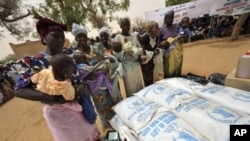Pregnant women and young children are especially vulnerable to food shortages across much of the African Sahel brought on by last year's poor rains.
Balki Bounou is nine months pregnant and malnourished. The 25-year-old says it has been hard to find enough food. Her pregnancy has come at time when poor rains have cut Niger's cereal harvest by one-quarter.
So Bounou walked to this feeding center in the village of Babulwa where the UN World Food Program supports targeted feeding for pregnant women and children under five.
Bounou says with pregnancy comes sickness. She is tired. She has no appetite. When she does feel like eating, she says it is hard to find food in her village of Zongodatchi.
Mothers and expectant mothers at this center also receive anti-malarial drugs. Doctor Hima Nomao says Bounou is anemic.
Doctor Nomao says he prescribes a treatment of anti-parasite medicine and iron to combat anemia. A pregnant woman is going to lose blood. So to compensate, he gives her iron for her and her baby.
Aid workers here track the level of malnutrition among children in the community. The UN Children's Fund says at least 200,000 children in Niger face severe acute malnutrition that will require hospital treatment.
Mothers receive sugar, oil, and an enriched blend of corn and soybeans for each of their children under five years of age.
The World Food Program last month doubled its estimate of the number of families in Niger who need food assistance and is now targeting more than 1.5 million people for a general food distribution and as many as 500,000 children under the age of six for specialized therapeutic feeding.
Malnutrition here has been on a steady rise since March. So these targeted feeding centers will continue at least through the hoped-for heavy rains in August.




